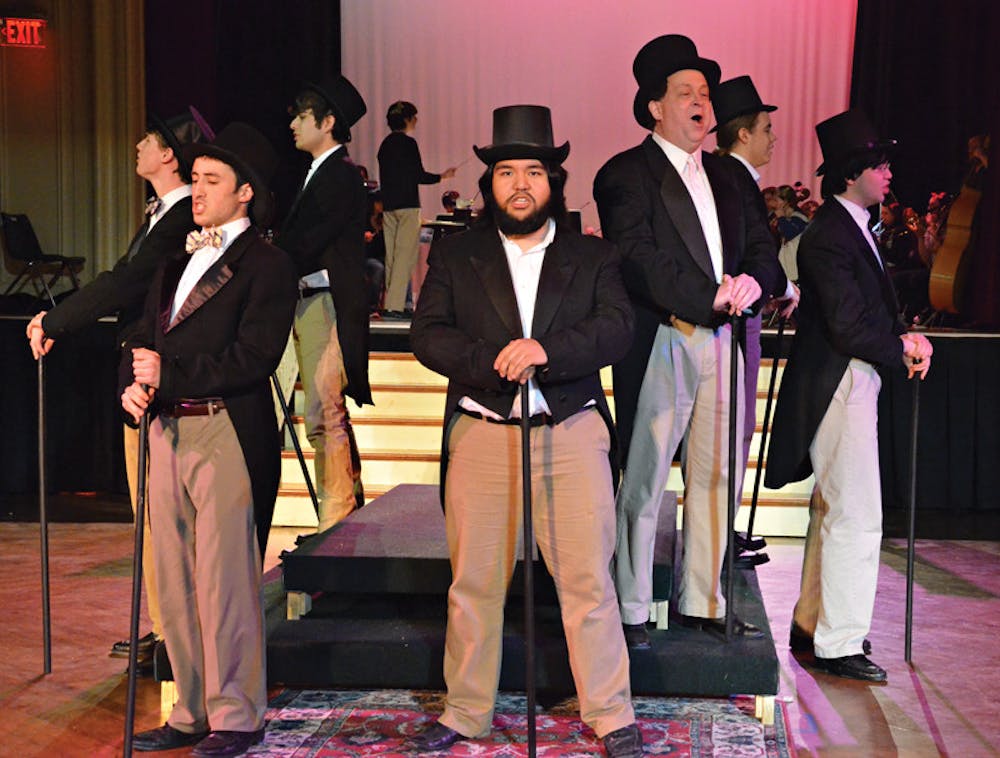Opera may seem like a genre of the past, but Gilbert and Sullivan’s “Iolanthe, or, The Peer and the Peri” transcends the bygone era from which it came.
Directed by Meghan Kelleher ’12 and presented by Brown University Gilbert and Sullivan, the opera will enchant a modern audience with its comic plot, unique interpretations of characters and talented acting.
Brown University Gilbert and Sullivan pays homage to the 19th-century theatrical partnership between librettist W. S. Gilbert and composer Arthur Sullivan, whose comic operas famously satirized the fusty conventions of Victorian England.
Gilbert caricatured these 19th-century social and political trappings to convey their stuffy absurdity — his antagonists are often bumbling and bombastic figures of power, with plots frequently revolving around the inanity of a bureaucratic loophole. Sullivan’s music provides dramatic scaffolding for Gilbert’s scripts, emphasizing the humor of satirical ditties or evoking pathos for characters thwarted by insufferable institutions of power.
Though “The Pirates of Penzance,” “H.M.S. Pinafore” and “The Mikado” are their best-known works, Gilbert and Sullivan produced 14 comic operas between 1871 and 1896. “Iolanthe” is the seventh of these productions.
The play opens with a troupe of immortal fairies reuniting with Iolanthe, a fairy returning from banishment — having been pardoned by the Fairy Queen — for committing the high crime of marrying a mortal.
Iolanthe introduces the fairies to her grown son, Strephon, who laments that he is a fairy only from the waist up. He does not initially reveal this genetic anomaly to Phyllis, a ward of the court, to whom he is betrothed. When the Lord High Chancellor forbids the marriage, the central action of the play unfolds, as Phyllis spies Strephon seeking solace in the arms of his eternally 17-year-old mother.
Reluctantly, Phyllis resigns herself to marry one of the members of the House of Peers — a chorus of dim-witted nobles who fawn on her as shamelessly as on the Lord High Chancellor.
Anna Stacy ’17, who plays Phyllis, demonstrates a broad range of expression with her clear, bright soprano, which lilts with glee as easily as it thunders with jealous rage. Even as she sings, her nuanced body language and refreshingly modern facial expressions make her the life force of the play. Phyllis’ open contempt for the dull and dreary members of the House of Peers is enhanced by Stacy’s gags of disgust and “can-you-believe-this-guy” eye rolls, a comic juxtaposition between the spunky and sycophantic.
But the scenes she shares with Strephon, played by Buck Greenwald ’14, are the ones that endear her the most to the audience. Their onstage chemistry feels real and unscripted — they tease each other with a natural, easy rhythm, and their faces noticeably light up when gazing into each other’s eyes.
Most actors manage to infuse their roles with distinct personality. Paul Martino ’17, who plays the Lord High Chancellor, performs with an understated, self-conscious irony, lending his character a sympathetic humanity, despite his pompous exterior. Thomas Chavez ’16 shines as the stuffy guard Private Willis, slipping in flamboyant gestures and fluid comic timing before resuming a stiff upper lip.
But there are a few moments when clarity is sacrificed for comic effect. Some of Gilbert’s most caustic satire is articulated through a rapid-fire succession of lyrical absurdities and multi-syllabic rhymes. Because it can be difficult for the audience to keep up with this convoluted rhetoric, nuggets of satirical brilliance are sometimes lost when actors fail to enunciate the lyrics clearly.
The pit orchestra, directed by Alec Kacew ’14 and Solomon Goldstein-Rose ’16, adds sprightliness to playful fairy scenes, grandiosity to scenes in the House of Peers and dramatic tension as these two worlds collide. Though the live music generally enhances the performance, cohesion between actors and the orchestra could be tighter, especially during faster songs in which even a slight mismatch in tempo can throw off the next few measures.
Aside from exposing the ineptitude of the British Parliament of Gilbert and Sullivan’s era, the play also takes a remarkably progressive approach toward conventional gender roles. In contrast to a traditional damsel in distress, Phyllis is unapologetically irreverent — a force to be reckoned with — and most of the heroic action comes from such pivotal female roles as Iolanthe and the Fairy Queen.
The show opens tonight in Alumnae Hall Auditorium at 8 p.m. It will run Saturday at 2 p.m and 8 p.m and Sunday at 3 p.m. Admission is free.

ADVERTISEMENT




